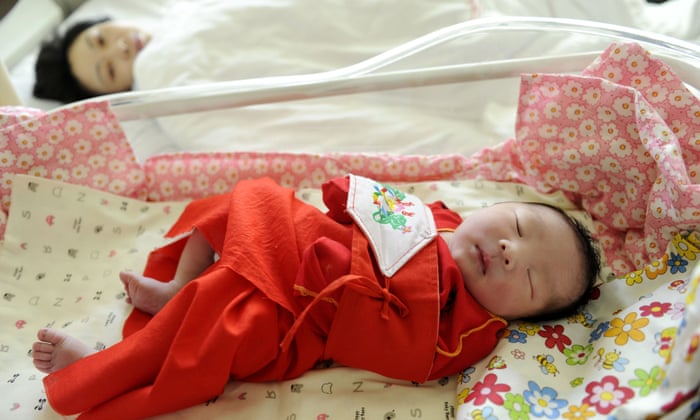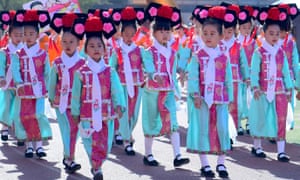No Mere Blip But a Blooper in Family Planning in China
"A great nation with thousands of years of history and a brilliant civilization is rapidly degenerating into a small group of the old and the weak thanks to these wrong-headed population-control policies."
Yi Fuxian, researcher, University of Wisconsin, Madison
"To put it frankly, giving birth is not only a family matter but also a national issue."
"Not wanting to have kids is just a lifestyle of passively giving in to society's pressures."
People's Daily newspaper
"All of us want another child. We want someone to keep him [first child] company."
"If we have a second child and our business is not good our quality of our life will go down, and I won't be able to offer such good things for both of them."
"Plus, it will be harder for me to go to work with two."
Zhou Jing, 29, Wuhan, Hubei province
"Wanting their children to move up the social ladder, or at least not to get stuck [is the goal for many Chinese parents]."
"It's not that people can't feed their children. It's how can that child be 'successful' and have a better life."
"Everything becomes a rat race."
Wang Feng, sociologist, University of California, Irvine
 |
| A mother sleeps beside her newborn baby at a hospital in Shenyang. Photograph: Imagine China/Rex/Shutterstock |
China's long-time one-child policy permitted parents with a girl or a disabled child to have another chance at a pregnancy to produce a robust child of their choice; preferably a son. If two children or a boy was their reality the family was given condoms, urged that the wife get an intrauterine device. If another pregnancy occurred, the state's solution was an abortion.
China wanted to take its 1.3 billion population to a place approximating prosperity. And to battle poverty the simple solution of limiting children in a family seemed promising.
That prohibition against more than one child (in urban settings; rural dwellers were permitted several) lasted for 36 years until the ruling Communist Party after enforcing its extreme form of social engineering regulating birthrates turned around when China realized its slogan of "If you want to become rich quickly have fewer children" wasn't quite the solution it had meant it to be.
To enforce its policy additional children were disallowed attendance at public school or to receive public health care. Since the one-child policy was brought into law 400 million abortions took place in China. And most, of course, were girls. Now China has young men desperate for wives and there are none to be had.
In today's China there are 100 million only-children under age 40. But income has risen from $200 per capita in 1980 to about $10,000 today. Forecast to peak at 1.45 billion population by 2027, then several decades of slump, by 2050, an estimated one-third of the population will reach 65 and older leaving a critically failing demographic of working age people.
What that will do to China's economy is obvious.
Where the ruling party once blamed economic problems on too many people, the new problem has become too few young people. Beijing had been moved to lift the ban in 2016 for practical reasons; to persuade their young families to increase their child numbers. It has become a patriotic duty to have at least two children where previously it was forbidden to have more than one. Trouble is, no one is listening.
While China's family planning authority had forecast 20 million births for 2018 in anticipation of a baby boom,15.23 million materialized. Living costs in China have skyrocketed, particularly in its immense cities. Long work hours are the norm, and the young marrieds of this generation appreciate the quality of their lives as opposed to that of their parents' generation. And naturally enough they look forward to their children experiencing similar living standard leaps.
Parents send their sole children to all manner of special education and recreation classes; English, piano, dance, art, gymnastic classes. That's costly. Leaving parents preferring to continue with the one-child policy where they can channel all their resources into preparing that single child's future. Singing classes, skating and art classes twice a week is time-consuming and costly. "I just hope she can maintain my level, my standard of living" said one mother of her four-year-old child for whom public-speaking lessons are also part of her social curriculum.
"There are too many children and the competition is too high. If you don’t do well in school you can’t get into a good university, and then maybe you can’t get a good job in the future."
"If we were to have another child, I’m afraid I wouldn’t have the energy for them."
"It’s hard to find time even to sleep for a few minutes in a chair [while waiting out her son's extracurricular lessons to enrich his school opportunities]."
Xu Meiru, 38, Shenyang, China
 |
| Children in traditional costume at a sports day in Shenyang, Liaoning province. Photograph: Reuters |
Labels: China, Economy, Population

<< Home